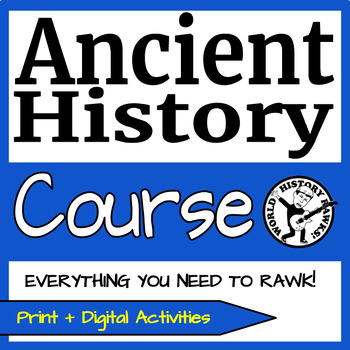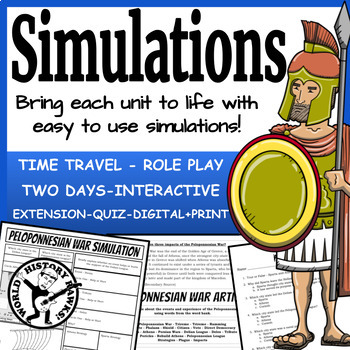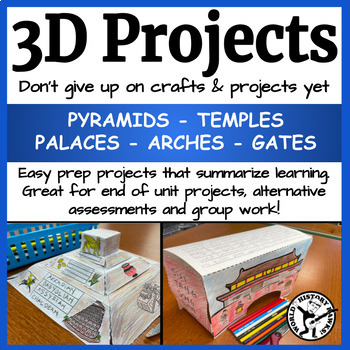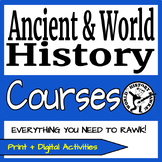Ancient History Curriculum - Greece Rome Egypt China India World Course
- Google Drive™ folder

Products in this Bundle (99)
showing 1-5 of 99 products
Bonus
Also included in
- Tired of using boring social studies curriculum? Then use a Middle School Ancient & World History Curriculum that is engaging for students and provides flexibility for teachers that covers the Roman Empire, European Middle Ages, Islamic Empires, Chinese Dynasties, Mesoamerica, West Africa, IndiaPrice $344.99Original Price $655.32Save $310.33
Description
Tired of using boring social studies curriculum? Then use Middle School Ancient History Curriculum that is engaging for students and provides flexibility for teachers that covers Early Humans, Ancient Mesopotamia, Ancient Egypt, Israel, Ancient India, Ancient China, Ancient Greece and the Roman Republic!
This curriculum is perfect for veteran and new teachers! It includes 96 activities to engage, excite and support middle school students. Let World History Rawks plan, so you can Rawk!
Updates coming August 2024!
Each unit starts with a Map and Reading Activities to help students develop their understanding of the locations they are studying.
Bell Ringers help students build their reading and writing skills while studying ancient and world history. Each bell ringer is focused on one theme such as government and one writing skill such as using key terms, citing evidence, identifying the subject/verb or correcting mistakes in sentences.
The core of most units are formed by the Empire Report Card Activities. In the Report Card Activities, students examine empires by reading theme based differentiated passages written at 2 - 3 different lexile levels to help teachers reach and challenge EVERY student. Students answer theme based questions then assign the empire a grade.
The differentiated reading passages and extension activities such as quizzes and collaborative 16x20 posters will help teachers support struggling and high achieving students!
If you have used GRAPES before but been frustrated that your textbook is NOT written thematically then you will LOVE how the Report Card Empire Articles are written.
Passages are written using the below themes.
- Rise
- Geography
- Government
- Economy
- Achievements
- Social System
- Religion
- Decline
Not all themes are used in every article.
The Hexagonal Thinking Activities are fun and interactive review or pre-writing activities that can be used with the above reading passages. Included FREE in the bonus file!
Nearly every unit has at least one interactive Historical Simulation. Bring history to life and develop a deeper understanding of historical events and patterns in your student with simulations!
What’s included
- Instructions
- Printable and digital handouts/ worksheets
- Printable and Google Form Quizzes
- PPT - Objective, questions and pictures
- Answer keys included when possible
3D Projects are hands-on activities where students select pictures of things they've learned in a unit then paste them on a 3D temple, pyramid or ziggurat. They then write a paragraph using the key terms that are represented by the pictures. These are great for the end of units, alternative assessments and group work.
Legacy Investigation Activities allow for a close examination of historical characters who appear in social studies standards. Students read several short passages about an historical figure and collect evidence on whether they had a positive or negative legacy. Students then can take a quiz, write an ACE or do a collaborative 16 x 20 poster. (Currently only Augustus and Charlemagne)
Documentary Handouts will provide yet another opportunity to dive deep or review into a topic by providing learning experiences for visual learners. These are great to use in place of a reading activity, or as a unit review. Answer keys included. Please note not all documentaries are freely available.
Play Doh Activities are great hands-on activities that focus around monuments and sculptures of ancient civilizations. Each includes a teacher guided Google Slides and a more independent student webquest.
Finally, Unit Tests are included for each unit.
What’s include
- Question bank
- Regular and Modified Multiple Choice
- Regular and Modified Writing Question that links to Report Card and Hexagonal Thinking Activities
- Printable and Google Form versions
- Study Guide
- All are editable!
- These will provide teachers with a head start when forming assessments that match their lessons and students.
Terms and topics covered: Early humans, hominids, hominins, migration, nomads, Homo erectus, Neanderthal, Denisovans, Homo sapiens, hunter gatherer, Paleolithic Age, bipedal, cave art, tools and weapons.
Terms and Topics covered: Mesopotamian geography, Tigris and Euphrates Rivers, Anatolia, Persian Gulf, Fertile Crescent, silt, plow, Sumer, Akkad, Sargon, empire, tribute, Nanna, scribes, polytheistic, ziggurats, adytum, cuneiform, Enheduanna, Mask of Sargon, Babylon, Hammurabi, centralized government, bureaucracy, code of law, Hammurabi’s Code, Assyria, calvary, exile, Kingdom of Israel, Ashurbanipal, Library of Nineveh, Medes, Chaldeans, Persia, Iranian Plateau, Zagros Mountains, Cyrus the Great, Achaemenid Empire, Immortals, Sparabara, Darius I, satrap, Royal Road, warrior aristocracy, Zoroastrianism, Ahuramazda, Angra Mainyu, Last Judgement Day, monothelitism, Pax Persica, qanat, Alexander the Great.
Terms and Topics covered: Egyptian geography, Nile River, delta, cataracts, Nubia, silk, fertile, Black and Red Lands, dynasty, Narmer/ Menes, double crown, pharaoh, vizier, priests, scribes, frontalism, anatomy, volume, Golden Ratio, hieroglyphs, scribes, papyrus, polytheistic, Re, Anabus, Osiris, mummies, Old Kingdom, mastabas, pyramid, step pyramid, Pyramid of Medium, Bent Pyramid, Red Pyramid, Great Pyramid, Great Sphinx, nomarchs, Middle Kingdom, Mentuhotep II, Sinai Peninsula, standing army, Mentuhotep III, Punt, mud brick pyramids, Hyksos, Avaris, King Ahmose, New Kingdom, Thebes, Hatshepsut, Thutmose III, Ramses II, Battle of Kadesh, treaty, ebony, Akhenaten, Aton, Nefertiti, Tutankhamun, obelisk, Valley of the Kings, Abu Simbel, Sea People, Kush, ebony, Piankhi, Memphis, Napata, Meroe, Amun, Isis, Tarhaqa.
Terms and Topics covered: Middle East geography, Canaan, Promised Land, covenant, Yahweh, monotheistic, Abraham, Moses, Exodus, Ten Commandments, Joshua, judges, Saul, David, Solomon, Solomon’s Temple, Seleucids, Maccabean Revolt, zealots, Masada, Jewish Diaspora.
Terms and Topics covered: China geography, Huang He, Shang, dynasty, North China Plain, social hierarchy, ancestor worship, bronze bowls, tombs, oracle bones, pictographs, characters, Zhou, Wu Wang, Mandate of Heaven, bureaucracy, legalism, bronze and iron, public works projects, standardization, Qin, Shi Huangdi, censor, Great Wall of China, Xiongnu, terracotta, Han, Liu Bang, bureaucrats, Confucianism, prime minister, Empress Lu, Wudi, watermills, grindstone, horse collar, roads, relay stations, paper, silk, silk road, mercenaries.
Ancient Indian Civilization and Empires
Terms and Topics covered: Indian geography, monsoon, Indus Valley, Indus River, Ravi River, tributary, Harappa, Mohenjo - Daro, thriving, city planning, pictograms, Hinduism, Aryans, vedas, epic poems, Mahabharata, Ramayana, dharma, karma, reincarnation, moksha, Brahma, Vishnu, Shiva, Ganesh, Siddartha Gautauma, Four Noble Truths, Eightfold Path, Maurya, Magadha, Chandragupta, Ganges Plain, Paliputra, Kautilya, Arthashastra, Ashoka, stoupas, Buddhism, infrastructure, caste system, brahim, kshatriya, vaishya, shudras, untouchables, Gupta, Chandra Gupta, overlords, patronized, women, kalidasa, gurus, Huns.
Mesoamerica - Olmec and Maya Civilization
Terms and Topics covered: Mesoamerican and South American geography, Andes, Yucatan Peninsula, slash and burn, Pacal II, Palenque, dualistic, cacao, glyph, calendar system, zero, Olmecs, Bay of Campeche, floodplain, mother culture, dynasty, jaguar spirit, pyramid, huge stone heads, Ball Game, Long Count Calendar, concept of zero, glyph, Yucatan Peninsula, Mayan, slash and burn, Pacal II, Palenque, dualistic, cacao, glyph, calendar system, zero.
Terms and Topics covered: Greek geography, Peloponnesus, Mediterranean Sea, Crete, Macedonia, Minoan, bureaucracy, Knossos, frescos, labyrinth, polytheistic, minotaur, entombed, Mycenaeans, infusion, wanax, Agamemnon, shaft graves, palace complexes, tall thick walls, high hill, cyclops, preside, dominate, Sea Peoples, Dark Ages, Athens, Solon, Cleisthenes, popular assembly, Council of 500, juries, agora, parthenon, Erechtheion, direct and limited democracy, Sparta, agoge, monarchy, aristocracy, tyranny, citizen, oligarchy, legislative, polis, acropolis, Peloponnesian War, Delian League, Alexander the Great, Hellenism.
Terms and Topics covered: Mediterranean geography, Rome, Roman Senate, Social System, patricians, plebeians, tribune, 12 Tables, Punic Wars, Carthage, Hannibal, Julius Caesar, Gaul, 1st Triumvirate, Republic in Crisis, Tiberius and Gaius Grachus, achievements, roads, aqueducts.
Finally, a pacing guide with tips on how to best plan and implement each unit is included as a bonus file. A link to an editable syllabus with a classroom management system and lesson plans to help teach class procedures is included.
ALL SALES ARE FINAL
Upon purchase you will be given links to add each activity of this course to your Google Drive.
A veteran teacher said ...
⭐️⭐️⭐️⭐️⭐️ Samantha H. said, "My students and I loved this resource. It was easy for them to follow along because it followed the same general format in every segment. I used this for whole group lessons for a combined middle/high classroom of students with behavioral challenges ranging from grades 6-12. All of them were engaged and learned something new that they still talk to me about at the end of the year. I recommend this resource to all of my teacher friends especially my social studies, history and english teacher friends."
And a new teacher in California emailed this feedback ...
"This curriculum can also be used to support TPA (Teacher Performance Assessment) planning for new student teachers. The differentiated instruction can be used on Focus Students during cycle 1 and the organized unit planning offers multiple points of assessment required for cycle 2. It also offers opportunities to "re-teach" at different points in the unit for cycle 2. The lessons are simple to execute and fairly student driven to keep the planning and prep work to a minimum, which is great for new teachers!"
❤️ The World History Rawks Curriculum is designed to provide teachers with resources that allow for flexibility and easy planning, so you can be your best ! Just familiarize yourself with each activity and you are good to go. Of course, if you have any questions, email me at middleschool@worldhistoryrawks.com.
Connect with World History Rawks!
Follow World History Rawks on TpT by clicking the blue follow star.
Click HEREto get NEW activity announcements sent to your email!
©World History Rawks
Permission to copy for single classroom use only.
Please purchase additional licenses if you intend to share this product.






